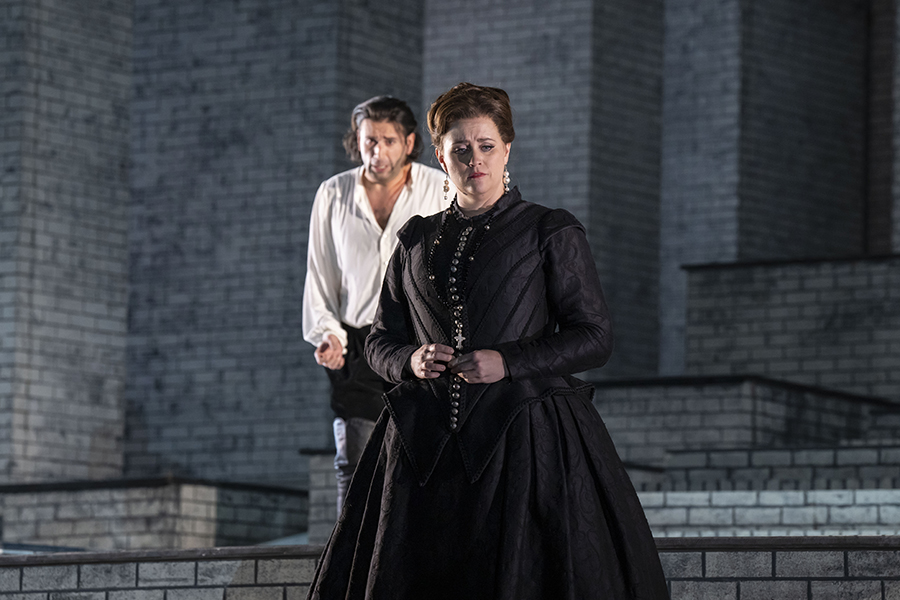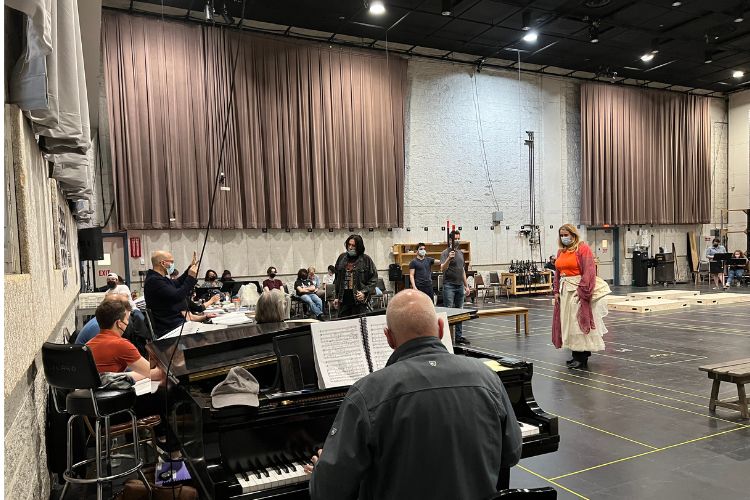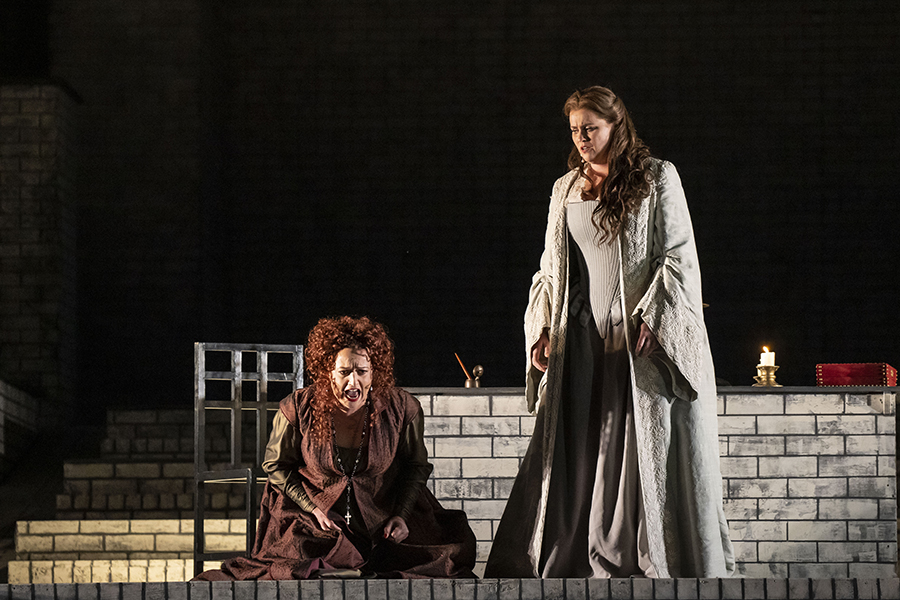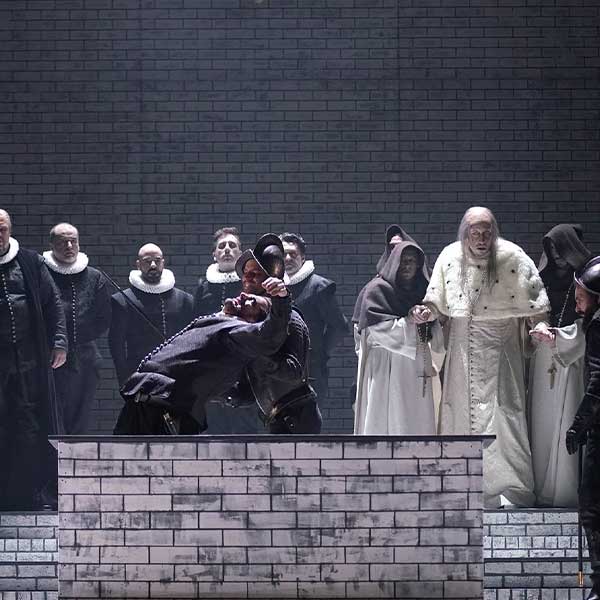November 22, 2022
Rachel Willis-Sørensen on becoming a Verdi heroine
To become a leading lady, it takes skill, strength, dedication, and a fair bit of luck. But what is it about a Verdi production that creates a true diva? We sat down with soprano Rachel Willis-Sørensen — Elisabeth in this November’s Don Carlos — to find out how she feels about starring in this behemoth of a production, how she relates to Elisabeth, and what makes a Verdi opera so grand.

Rachel Willis-Sørensen as Elisabeth and Joshua Guerrero as Carlos in Verdi's Don Carlos.
Lyric: How does it feel to be back at Lyric for Don Carlos?
Willis: It’s amazing! I love Chicago; it's such a wonderful city. You have access to everything: incredible food, mind-blowing culture, and people are very nice and helpful — it's like the perfect combination of Los Angeles 'nice' and New York 'kind'. I really love it. Plus, downtown smells like chocolate because of the chocolate factory, and the opera house itself is just burgeoning with creative energy.
Lyric: What has been the most difficult aspect of this production for you thus far?
Willis: I suppose the most difficult aspect of the production for me thus far is the general nature of a role debut and my level of perfectionism in a language that I respect so much and love singing in, but find quite challenging.
Lyric: What about the most rewarding?
Willis: The production itself. David McVicar's work is so detailed and so psychologically whole and sound; you're dealing with every line individually and as a whole, totally understanding the journey of the character. There are no doubts... I mean, if you work and cooperate with the director, this is the kind of production that is like an actress's dream come true because there is so much internal work which is just so satisfying. I feel it is my job as a singer to bridge the honesty gap for the audience between the non naturalism of: 'we're singing, we're on stage in period costumes' and their heart that has real human sentiment, and in a production like this, you really have that opportunity.
Lyric: This is a role debut, how have you been preparing?
Willis: I have been working really hard with the text, with various French speakers and listening to different recordings, playing it through on the piano, and writing down the text, studying the word-by-word translation, and saying it in the original French as naturalistically as possible, doing the sub-text work... I've been doing a lot of work!

Rachel Willis-Sørensen in rehearsal for Don Carlos.
Lyric: Are there any ways you relate to your character (Elisabeth)? If not, what are your thoughts on some of the decisions she makes as the story progresses?
Willis: I do relate to her, and I can totally understand why she makes the decisions that she makes as the story progresses. I think she's dancing on the edge of a knife, trying to save herself from doing wrong, in the face of enormous temptation, and I think it's so incredible that she chooses to not have an affair with Carlos even though that's clearly what she wants to do. Also, I think for the audience and certainly for me now, I think 'wow': like I guess in her case it's not just about her — I mean she ended the war by making that decision. And I think a lot of people would not have the moral fortitude to do that, they would just cave and have the affair that their body is really wanting them to have. I don't know what is right or wrong, I think it's really hard to say...
I know how it is to deny your own needs for someone else's benefit and still suffer twice because not only do you not get your needs met but you're accused by the other person of having betrayed them when you didn't. Another thing I relate to about her is this absolute dedication to trying to do the right thing at even at the expense of her own happiness, and deeply believing that by choosing the side of 'right', she will be given the gift of happiness and then the bitter realization that that's not how it works, and that she had to sacrifice herself for the benefit of others and she was sort of happy to do it but she finds herself in the rubble, the wreckage of that decision and has to live out the rest of her life. That's a bleak reality. I have looked down that barrel of the gun myself which makes it easy to play her. Also the anxiety and the disillusionment of believing so much in love, believing that love will save you, and realizing that you can't have what you needed.

Rachel Willis-Sørensen as Elisabeth and Clémentine Margaine as Eboli in Verdi's Don Carlos.
Lyric: Are there any major differences in being the leading lady in a Verdi opera versus other composers?
Willis: Yeah I've been told that Verdi is the diva maker, and that singing Traviata, Trovatore, and Don Carlos — these are the kind of operas that really make you a diva, put you on the map. It certainly feels really wonderful to sing these roles, and I think that the feminine strength that is shown in each of Verdi's heroines is really rewarding to portray and I think it gets a lot of attention, in a positive sense!
Lyric: What do you hope audiences are able to take away from Don Carlos?
Willis: I hope that they are able to have compassion for people in a variety of circumstances, I hope that engaging with this story awakens their appreciation for their own religious freedoms, and their freedom to exist and choose the life that best suits them instead of being forced by virtue of their birth to choose a life that saves other people at their own expense.
For the first time, experience the five-act, French "Modena version" of Verdi's Don Carlos, November 9-25.

